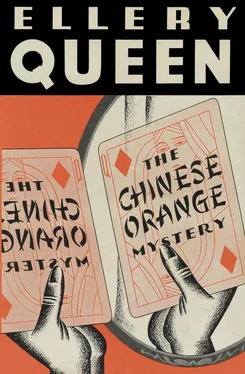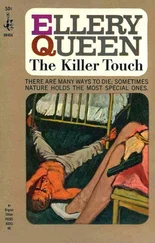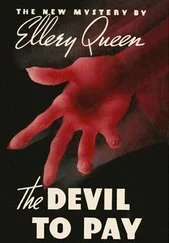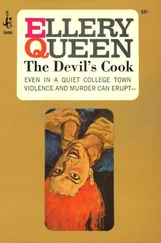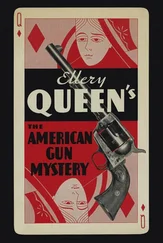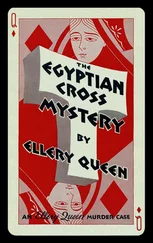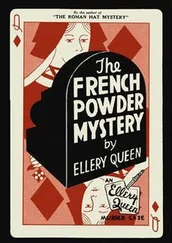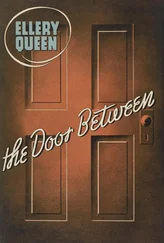The house doctor, a broad squat cold-eyed man, got to his feet with amazement written all over his stony face. Nye, the manager, an elegant creature in a cutaway with a gardenia in his lapel as depressed-looking as himself, was biting his lips beside Ellery at the door. Brummer, the burly house detective, scraped his blue jaws rather pathetically at the open window.
“Well, Doctor?” said Ellery abruptly.
The man started. “Oh, yes. You want to know, I suppose, how long he’s been dead. I should say he died at about six — a little over an hour ago.”
“From the effects of the blow on his head?”
“Unquestionably. The poker shattered the skull, causing instant death.”
“Ah,” said Ellery. “That’s a most vital point, Doctor—”
“Generally is,” said the doctor with a grim smile.
“Ha, ha. There’s no doubt in your mind about death having been instantaneous?”
“My dear sir!”
“I beg your pardon, but we must be sure. And the bruise on his face?”
“Caused by his fall, Mr. Queen. He was dead when he struck the floor.” Ellery’s eyes flickered, and the physician moved toward the door. “I’ll be glad, of course, to repeat my opinion to your Medical Examiner—”
“Scarcely necessary. By the way, there couldn’t be a different cause of death, I suppose?”
“Nonsense,” said the squat man with asperity. “I can’t say without a physical examination and autopsy what other signs of violence exist, but death occurred from the effects of the cranial blow, take my word for it. All the external indications—” Something gleamed in his cold eyes. “See here, you mean that the blow on the skull may have been inflicted after death from a different cause?”
“Some such idiotic notion,” muttered Ellery, “was in my mind.”
“Then get it out of your mind.” The physician hesitated, struggling with an ingrained professional reticence. Then he shrugged. “I’m not a detective, Mr. Queen, and this sort of thing is decidedly out of my line. But if you’re looking for something odd, may I point out the condition of this man’s clothing?”
“Clothing? Yes, yes, point it out, by all means. I can’t say, at this stage of the game, that I should disdain the viewpoint of even a layman.”
The doctor eyed him sharply. “Of course,” he said in a steel-barbed rasp, “with all your experience — I’ve heard of you, Queen — I suppose the condition of this man’s clothing and its possible significance is childishly clear. But to my infantile mind it seems rather remarkable that — he’s got all his clothes on backwards !”
“Backwards?” said Nye with a groan. “Oh, good Lord.”
“Didn’t you notice, Mr. Nye?” rumbled Brummer, scowling. “Damnedest thing I ever saw.”
“Please, gentlemen,” murmured Ellery. “Specifically, Doctor?”
“His coat is on as if he’d got into it the wrong way, as if somebody held it open facing him and he wriggled into the sleeves and then buttoned himself up the back.”
“Masterly! Although not necessarily an exclusive diagnosis. Go on, sir.”
Brummer said peevishly: “Why in hell should a man put his coat on backwards? It’s nuts.”
“A strong word, Brummer, but inept. ‘Improbable’ would be more to the point. Did you ever try to put your coat on backwards?”
“I don’t see—” began the detective belligerently.
“Apparently not. I should explain that the improbability lies not in the donning of the coat, but in the buttoning.”
“How d’ye figure that?”
“Do you think you could put your coat on backwards and button it up yourself, with the buttons studding the vertebrae along your spinal column? And the inverted, wrongly placed sleeves hampering the elevating possibilities of your arms?”
“I got you. Sure I could.”
“Well, perhaps so,” sighed Ellery. “Proceed, Doctor. Pardon the aside.”
“You’ll have to excuse me,” said the doctor abruptly. “I merely wished to call your attention—”
“But I assure you, Doctor—”
“If the police want me,” continued the cold-eyed man with a faint emphasis on the third word, “I shall be in my office. Good evening!” And he stumped past Ellery out of the room.
“A clear case of the frustration psychosis,” said Ellery. “Fool!”
The door clicked behind the physician in a dismal silence. They regarded the corpse with varying expressions — Nye glassily, Brummer gloomily, and Ellery with a furious frown. The pervading impression of unreality persisted. Not only was the dead man’s coat on backwards, but his trousers were inverted and buttoned up behind as well. As were his white madras shirt and vest. His narrow stiff collar similarly was turned about, clamped with a shiny gold collar-button at the nape. His undergarments apparently exhibited the same baffling inversion. Of all his clothing only his shoes remained in the orthodox position.
His topcoat, hat, gloves, and woolen scarf lay on a chair near the table in a tumbled heap. Ellery sauntered to the chair and picked up the scarf. On one edge in the middle of the scarf were several bloodstains. A tiny stain, hardened to a crust, also existed at the back of the topcoat collar. Ellery dropped the garments with a frown and bent low, searching the floor. He could find nothing. No — yes, there was a splatter that might have been blood on the hardwood surface of the floor beyond the edge of the rug! Near the chair... He went quickly to the far side of the room and bent over the dead man. The floor about him was clean. Ellery rose and stood back, followed by the dull glances of the two men. The dead man lay parallel with the sill of the door, roughly between the two bookcases which flanked the doorway. The case to the left, as he faced the door, had been pulled from its original position flat against the wall so that its left side touched the hinges of the door and its right side swung out into the room, the shifted bookcase forming an acute angle with the door. The body lay half behind it. The case to the right had been moved farther to the right.
“What do you make of it, Brummer?” asked Ellery suddenly, turning around. There was no irony in his tone.
“I tell you it’s nuts,” exploded Brummer. “I never seen nothin’ like it in all my born days, an’ I pounded a beat, Mr. Queen, when your father was a Captain in his precinct days. Whoever pulled this ought to been put in the booby-hatch.”
“Indeed?” said Ellery thoughtfully. “If not for one remarkable fact, Brummer, I should be tempted to agree... And the gentleman’s horns? You explain those, also, by the general irrationality of the murderer?”
“Horns?”
Ellery gestured toward the two iron points protruding from beneath the dead man’s coat at his back. They were the broad flat pointed blades of African spears. As the man lay face down, the outline of the hafts bulged under his clothes. Apparently the spears had been thrust up his trousers at the back of the foot, one to each leg, rammed up and out at the waist, and pushed under the reversed coat at the man’s back until they emerged from the V-shaped lapels. The butts of the spears were flush with the dead man’s rubber heels. Each weapon was at least six feet in length, and the blades gleamed high above the bald bloody skull. The spears under the tightly buttoned trousers and coat gave the dead man a curious appearance: for all the world like a slain animal which had been trussed up and slung upon two poles.
Brummer spat out the window. “Cripe! Gives you the creeps. Spears... Say, listen, Mr. Queen, you got to admit it’s nuts.”
“Please, Brummer,” murmured Ellery with a wince, “spare us these repetitions. The spears, I confess, are difficult. And yet I’ve found that nothing in this world is incapable of explanation if only one is smart enough or lucky enough to think of it. Mr. Nye, are these Impi stickers the property of the hotel? I’d no idea our better hostelries went in for primitive decoration.”
Читать дальше
